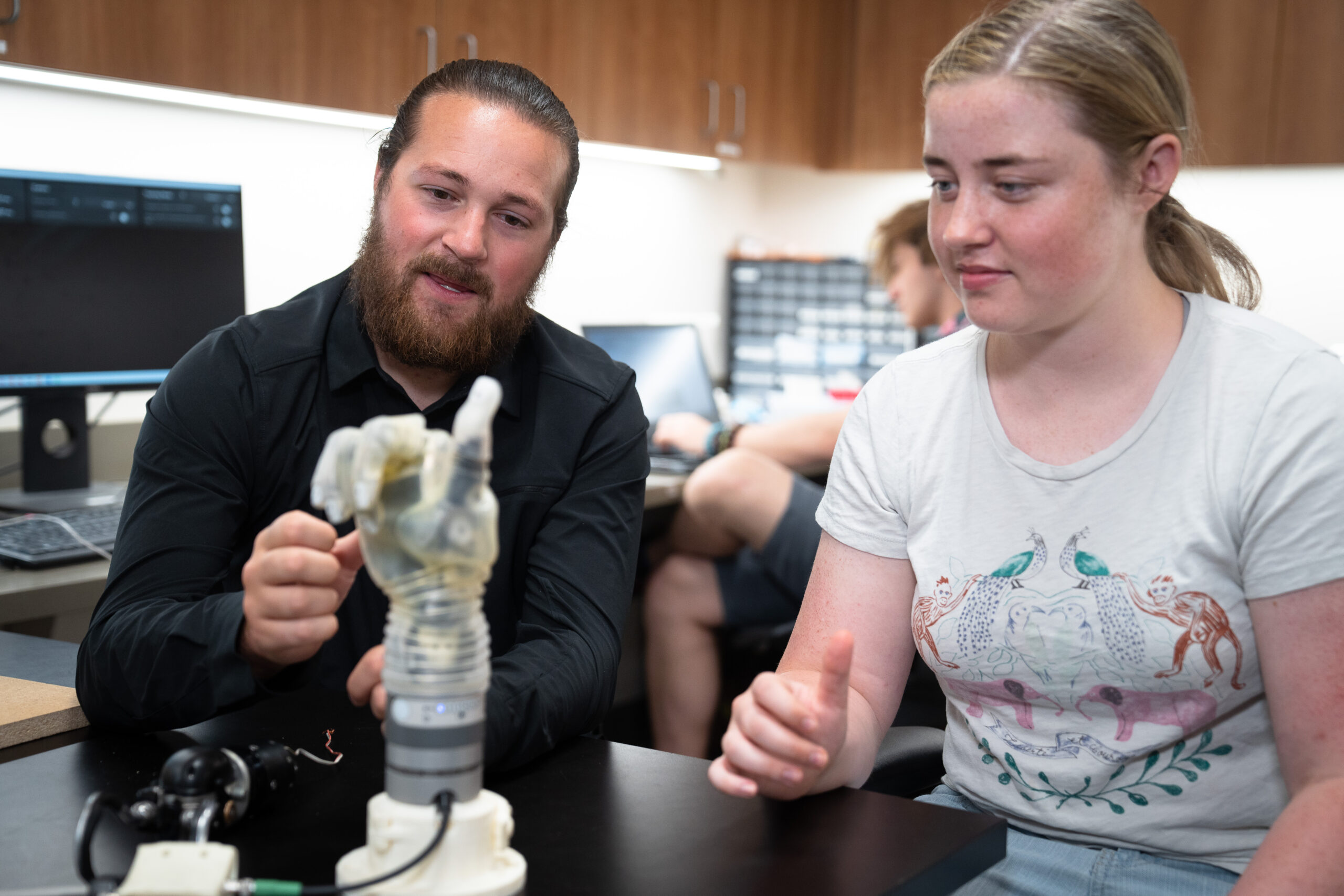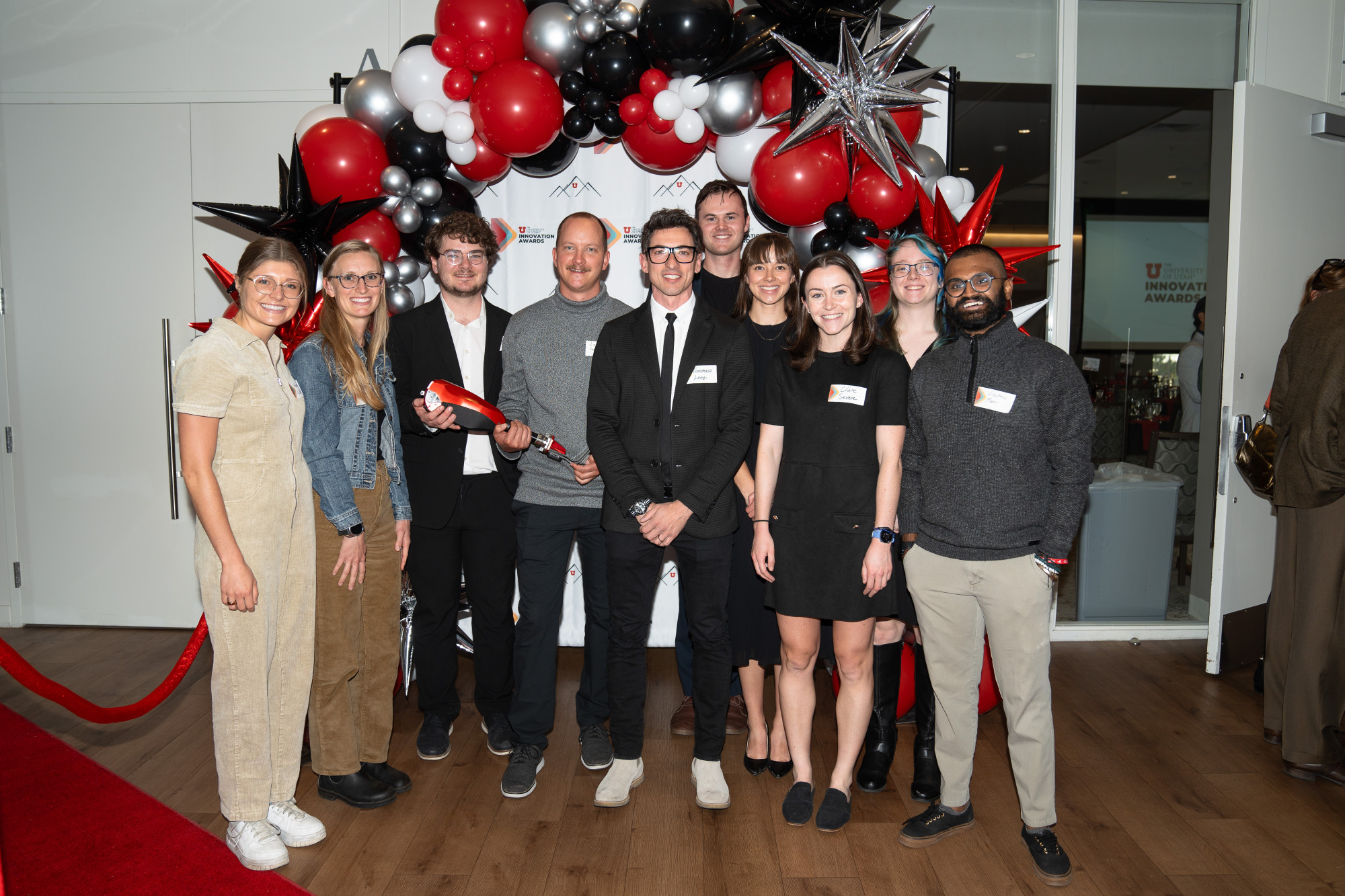Researchers at the University of Utah’s John A. Moran Eye Center and the John and Marcia Price College of Engineering have collaborated to create a new robotic surgery device that aims to give surgeons “superhuman” hands. The researchers successfully tested the robot using enucleated pig eyes, publishing their results in the journal Science Robotics. The study was led by Jake Abbott, a professor in Price Engineering’s Department of Mechanical Engineering and chair of the Robotics Center, and Moran Eye Center retinal specialist Paul S. Bernstein, MD, PhD. Coauthors include Abbott lab members Nicholas Posselli, PhD, and Robotics student Zachary Olson, Moran Eye Center...
Read MoreDr. George Recognized with University Early Career Teaching Award
Excellence in Action: Each year, the University of Utah recognizes the achievements of exceptional faculty members in teaching, research, mentorship and service. Robotics Faculty Jacob A. George is a 2025 recipient of the Early Career Teaching Award. “Within Dr. George’s research lab, his mentorship demonstrates his innovative, student-centered approach. With his space being housed within the Neilsen Rehabilitation Hospital, Dr. George leverages that and champions interdisciplinary collaboration across researchers and various healthcare professionals. This helps create an environment where diverse perspectives are sought out, ensuring that our research efforts are centered around patient needs.” – excerpt from nomination...
Read MoreHGN Lab Team Recognized by U Innovation Awards
The HGN Lab Team, led by Professor Tommaso Lenzi, received a U Innovation Award for Breakthrough of the Year in recognition of their work on The Utah Bionic Leg. The leg represents a revolutionary advancement in prosthetic technology. It is build for lower-limb amputees and uses motors, processors, and advanced artificial intelligence to give users greater power and control. This helps amputees achieve new levels of mobility through reduced physical strain. The Utah Bionic Leg was developed by Lenzi and a team of graduate students including: Lukas Gabert, Brendan Ortolano, Marissa Cowan, Liam Sullivan, Grace Hunt, Clare Severe, Vishnu...
Read MoreRobotics Center Faculty Join ARPA-H Project to Develop Fully Automated Surgical Robot
...
Read MoreUWR Lab received an R03 grant ($150k) from NICHD
Professor Zhang’s UWR lab received a small research grant (R03) from the Eunice Kennedy Shriver National Institute of Child Health and Human Development. This 2-year, $150K award will help build a new neck exoskeleton device for people with amyotrophic lateral sclerosis using a carbon-based fabrication method. This project is expected to generate preliminary data to support clinical translation of the neck exoskeleton technology to homes of patients with limited head-neck mobility. This award will be used to support a graduate student to conduct the proposed research. The details regarding the project can be found here: https://reporter.nih.gov/search/mVjRrUYz1U-V3Fs-WAGBvg/project-details/10811000...
Read MoreJake George Awarded College of Engineering Outstanding Teacher
Robotics faculty, Jake George received the 2024 Price College of Engineering Outstanding Teacher award from Dean Musgrave....
Read MoreUtah Neurorobotics Lab Wins Proposal Grant
Utah Neurorobotics Lab members win proposal grant at the RAC Grand Challenge...
Read MoreIEEE Conference in Japan
University of Utah Robotics faculty Alan Kuntz and John Hollerbach, with Robotics students, attended the 2024 IEEE International Conference on Robotics and Automation (ICRA) in Yokohama, Japan this spring. UofU students, alongside these professors, were able to engage in talks, exhibits, workshops and technical training with researchers all over the world. The conference's aim was to help build relationships and potential collaborations with participants within and outside their field of study. ICRA brings together robotics researchers, students and industrial partners from around the world to discuss the latest innovations and breakthroughs, highlighting the role of robotics and automation in...
Read MoreUWR Lab Published in TNSRE
Dr. Haohan Zhang and the Utah Wearable Robotics Lab have published in the IEEE Transactions on Neural Systems and Rehabilitation Engineering (TNSRE) journal entitled “Preliminary Study on Effects of Neck Exoskeleton Structural Design in Patients With Amyotrophic Lateral Sclerosis”. ABSTRACT: Neck muscle weakness due to amyotrophic lateral sclerosis (ALS) can result in dropped head syndrome, adversely impacting the quality of life of those affected. Static neck collars are currently prescribed to hold the head in a fixed upright position. However, these braces are uncomfortable and do not allow any voluntary head-neck movements. By contrast, powered neck exoskeletons have the...
Read MoreU Student Robotics Club Scores Bronze at National Competition
The Utah Student Robotics club from the University of Utah’s John and Marcia Price College of Engineering is returning home from NASA’s Kennedy Space Center with awards in tow. The U team started in a field of 58, and made it to the University of Central Florida’s Lunabotics Qualifying Event held at the Florida Space Institute’s Exolith Lab alongside 41 other teams. Placing second at the Qualifying event, the U Team moved on to the Kennedy Space Center to compete in the challenge’s Finals. Read the full story here....
Read More

